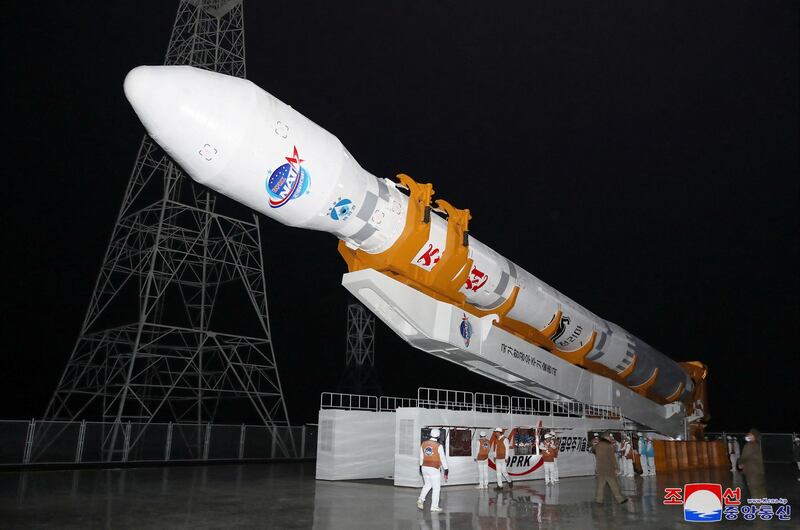Russia has likely offered North Korea technological advice for its latest illegal satellite launch, the South’s spy agency said Thursday, weighing in on weeks of speculation of Moscow’s backing that could expedite Pyongyang’s efforts to complete its surveillance system by 2025.
South Korea’s lawmaker Yoo Sang-beom told reporters about the affirmation from the nation’s National Intelligence Service (NIS) following a briefing by the spy agency in the South Korean parliament.
North Korea – which leveraged its strengthened ties with Moscow after a landmark September summit between its leader Kim Jong Un and Russian president Vladimir Putin – had “provided Russia with design blueprints and data related to the first and second stages of a launch vehicle,” Yoo said.
“Russia, in turn, is believed to have shared its analysis results [with North Korea].
“Therefore, the success of this launch vehicle is thought to have been aided by Russian assistance,” the lawmaker added.
Cheon Seong-whun, a former security strategy secretary for South Korea’s presidential office, said Moscow’s help would aid North Korea’s ultimate ambition to launch multiple satellites to spy on the activities of South Korea, as well as its security cooperation with the U.S. and Japan.
“Russia’s technological support clearly aids North Korea in its attempt to secure a complete satellite surveillance system that it vowed to have,” Cheon said. “As Russia is already a nation with such technological capabilities, it would, no doubt, be beneficial to North Korea.”
Kim’s ambition
Last year, Kim announced his plan to deploy “a large number of reconnaissance satellites” by 2025, aimed at monitoring what he termed as “hostile” military activities of the U.S. and its allies, the official Korean Central News Agency (KCNA) had reported.
That plan is being put into action, as evidenced by the statement from North Korea’s National Aerospace Development Administration on Tuesday, when it declared that the “militarization of space” by the allies was compelling Pyongyang to “further accelerate our self-defensive space development projects, including the development of military reconnaissance satellites.”
The deployment of satellites, Cheon emphasized, is particularly crucial for Pyongyang to maintain its status as a nuclear state. “Satellites play a crucial role in demonstrating nuclear power, as they enable the observation of potential targets,” the former presidential official said.
“In this context, Russia’s role in aiding such satellite development is considered significant.”
North Korea’s illegal satellite launch late Tuesday formally marks its initiation of its space ambition, despite international warnings. Rocket technology can be used for both launching satellites and missiles. For that reason, the U.N. bans North Korea from launching a ballistic rocket, even if it claims to be a satellite launch.

As a countermeasure, Seoul on Wednesday suspended some parts of the 2018 inter-Korean military agreement to resume its surveillance. Following Seoul's response, Pyongyang declared its complete withdrawal from the 2018 deal, with it pledging to deploy its latest weaponry along the border with South Korea.
The two Koreas had agreed to halt what the other has defined as hostile actions toward one another near the border.
Shortly after the launch, Pyongyang, through a KCNA report, claimed victory for “accurately” launching a spy satellite into orbit, a feat that was corroborated by the South’s NIS.
More Russian support?
Going forward, the NIS believes that there are additional technological realms where Pyongyang could seek Moscow’s assistance. The NIS pointed out that one aspect of North Korea’s technological shortcomings is in solid-fuelled Intercontinental Ballistic Missiles (ICBM), where development of home-grown technology remains at the infancy stage.
Another could be soliciting further assistance to perfect its surveillance system, in light of a lack of definitive proof that demonstrates the full surveillance capabilities of the North’s satellite system, according to the South Korean spies. They remain skeptical of North Korea’s capabilities despite claims that its satellite is capturing images of a U.S. military airbase in Guam.
Yoo, citing the NIS, also told reporters that the analysis of debris from North Korea’s previous failed reconnaissance satellite launch suggests that the satellite was not advanced enough to be classified as a reconnaissance satellite.
“Given that developing new satellites usually takes around three years, it is believed that North Korea still lacks the ability to conduct effective reconnaissance. Concrete evidence, such as the release of images or videos showing the satellite capturing Guam, is needed to verify its capabilities,” he said.
In August, North Korea failed for the second time to launch a satellite, three months after an unsuccessful first attempt.
A month later, Kim and Putin met at the symbol of Russian space prowess in Russia's Far East, and vowed to form an "anti-imperialist united front." Pyongyang often refers to the U.S. and its allies as "imperialists."
Earlier this month, the NIS reported that since early August, Russia has acquired over 1 million artillery shells from North Korea. This procurement is perceived as a reciprocal gesture for Russia’s assistance in providing technology for Pyongyang’s satellite launch.
Edited by Elaine Chan and Mike Firn.
